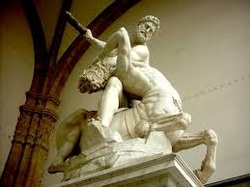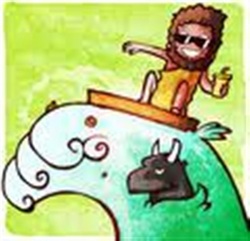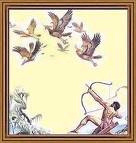The Great Labors of Hercules
The Erymanthian Boar

"For the fourth labor, Eurystheus ordered Hercules to bring him the Erymanthian boar alive. Now, a boar is a huge, wild pig with a bad temper, and tusks growing out of its mouth. This one was called the Erymanthian boar, because it lived on a mountain called Erymanthus. Every day the boar would come crashing down from his lair on the mountain, attacking men and animals all over the countryside, gouging them with its tusks, and destroying everything in its path. On his way to hunt the boar, Hercules stopped to visit his friend Pholus, who was a centaur and lived in a cave near Mount Erymanthus. Everyone knows that centaur is a human from his head to his waist, and a horse for the rest of his body and his legs. Hercules was hungry and thirsty, so the kindly centaur cooked Hercules some meat in the fireplace, while he himself ate his meat raw. When Hercules asked for wine, Pholus said that he was afraid to open the wine jar, because it belonged to all the centaurs in common. But Hercules said not to worry, and opened it himself. Soon afterwards, the rest of the centaurs smelled the wine and came to Pholus's cave. They were angry that someone was drinking all of their wine. The first two who dared to enter were armed with rocks and fir trees. Hercules grabbed burning sticks from the fireplace and threw them at the centaurs, then went after them with his club. He shot arrows at the rest of them and chased after them for about twenty miles. The rest of the centaurs fled in different directions. One of the centaurs, Chiron, received a wound that no amount of medicine would heal...but what happened to Chiron is another story. While Hercules was gone, Pholus pulled an arrow from the body of one of the dead centaurs. He wondered that so little a thing could kill such a big creature. Suddenly, the arrow slipped from his hand. It fell onto his foot and killed him on the spot. So when Hercules returned, he found Pholus dead. He buried his centaur friend, and proceeded to hunt the boar. It wasn't too hard for Hercules to find the boar. He could hear the beast snorting and stomping as it rooted around for something to eat. Hercules chased the boar round and round the mountain, shouting as loud as he could. The boar, frightened and out of breath, hid in a thicket. Hercules poked his spear into the thicket and drove the exhausted animal into a deep patch of snow. Then he trapped the boar in a net, and carried it all the way to Mycenae. Eurystheus, again amazed and frightened by the hero's powers, hid in his partly buried bronze jar."
(http://www.perseus.tufts.edu/Herakles/boar.html)
(http://www.perseus.tufts.edu/Herakles/boar.html)
The Augean Stables Hercules Cleans Up

(FUNNY PICTURE :))
"For the fifth labor, Eurystheus ordered Hercules to clean up King Augeas' stables. Hercules knew this job would mean getting dirty and smelly, but sometimes even a hero has to do these things. Then Eurystheus made Hercules' task even harder: he had to clean up after the cattle of Augeas in a single day. Now King Augeas owned more cattle than anyone in Greece. Some say that he was a son of one of the great gods, and others that he was a son of a mortal; whosever son he was, Augeas was very rich, and he had many herds of cows, bulls, goats, sheep and horses. Every night the cowherds, goatherds and shepherds drove the thousands of animals to the stables. Hercules went to King Augeas, and without telling anything about Eurystheus, said that he would clean out the stables in one day, if Augeas would give him a tenth of his fine cattle. Augeas couldn't believe his ears, but promised. Hercules brought Augeas's son along to watch. First the hero tore a big opening in the wall of the cattle-yard where the stables were. Then he made another opening in the wall on the opposite side of the yard. Next, he dug wide trenches to two rivers which flowed nearby. He turned the course of the rivers into the yard. The rivers rushed through the stables, flushing them out, and all the mess flowed out the hole in the wall on other side of the yard. When Augeas learned that Eurystheus was behind all this, he would not pay Hercules his reward. Not only that, he denied that he had even promised to pay a reward. Augeas said that if Hercules didn't like it, he could take the matter to a judge to decide. The judge took his seat. Hercules called the son of Augeas to testify. The boy swore that his father had agreed to give Hercules a reward. The judge ruled that Hercules would have to be paid. In a rage, Augeas ordered both his own son and Hercules to leave his kingdom at once. So the boy went to the north country to live with his aunts, and Hercules headed back to Mycenae. But Eurystheus said that this labour didn't count, because Hercules was paid for having done the work."
(http://www.perseus.tufts.edu/Herakles/stables.html)
"For the fifth labor, Eurystheus ordered Hercules to clean up King Augeas' stables. Hercules knew this job would mean getting dirty and smelly, but sometimes even a hero has to do these things. Then Eurystheus made Hercules' task even harder: he had to clean up after the cattle of Augeas in a single day. Now King Augeas owned more cattle than anyone in Greece. Some say that he was a son of one of the great gods, and others that he was a son of a mortal; whosever son he was, Augeas was very rich, and he had many herds of cows, bulls, goats, sheep and horses. Every night the cowherds, goatherds and shepherds drove the thousands of animals to the stables. Hercules went to King Augeas, and without telling anything about Eurystheus, said that he would clean out the stables in one day, if Augeas would give him a tenth of his fine cattle. Augeas couldn't believe his ears, but promised. Hercules brought Augeas's son along to watch. First the hero tore a big opening in the wall of the cattle-yard where the stables were. Then he made another opening in the wall on the opposite side of the yard. Next, he dug wide trenches to two rivers which flowed nearby. He turned the course of the rivers into the yard. The rivers rushed through the stables, flushing them out, and all the mess flowed out the hole in the wall on other side of the yard. When Augeas learned that Eurystheus was behind all this, he would not pay Hercules his reward. Not only that, he denied that he had even promised to pay a reward. Augeas said that if Hercules didn't like it, he could take the matter to a judge to decide. The judge took his seat. Hercules called the son of Augeas to testify. The boy swore that his father had agreed to give Hercules a reward. The judge ruled that Hercules would have to be paid. In a rage, Augeas ordered both his own son and Hercules to leave his kingdom at once. So the boy went to the north country to live with his aunts, and Hercules headed back to Mycenae. But Eurystheus said that this labour didn't count, because Hercules was paid for having done the work."
(http://www.perseus.tufts.edu/Herakles/stables.html)
The Stymphalian Birds

"After Hercules returned from his success in the Augean stables, Eurystheus came up with an even more difficult task. For the sixth Labor, Hercules was to drive away an enormous flock of birds which gathered at a lake near the town of Stymphalos. Arriving at the lake, which was deep in the woods, Hercules had no idea how to drive the huge gathering of birds away. The goddess Athena came to his aid, providing a pair of bronze krotala, noisemaking clappers similar to castanets. These were no ordinary noisemakers. They had been made by an immortal craftsman, Hephaistos, the god of the forge. Climbing a nearby mountain, Hercules clashed the krotala loudly, scaring the birds out of the trees, then shot them with bow and arrow, or possibly with a slingshot, as they took flight. Some versions of the legend say that these Stymphalian birds were vicious man-eaters. The 2nd century A.D. travel writer, Pausanias, trying to discover what kind of birds they might have been, wrote that during his time a type of bird from the Arabian desert was called "Stymphalian," describing them as equal to lions or leopards in their fierceness. He speculated that the birds Hercules encountered in the legend were similar to these Arabian birds."
(http://www.perseus.tufts.edu/Herakles/birds.html)
(http://www.perseus.tufts.edu/Herakles/birds.html)
